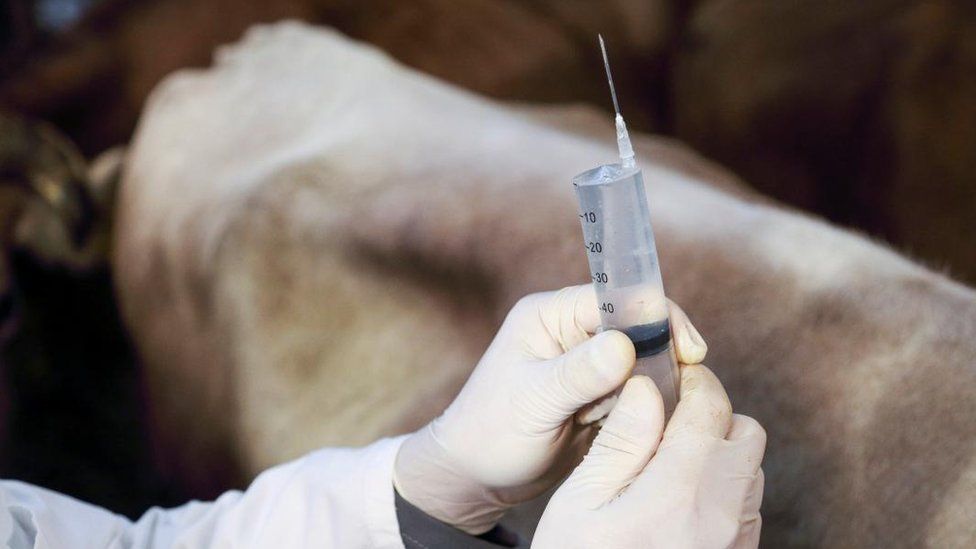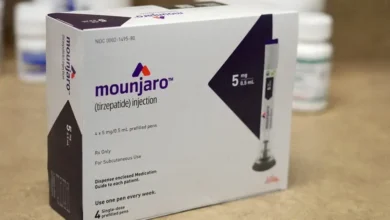Schools and NHS caterers ‘must stop’ antibiotic overuse

Hospital and school caterers are not doing enough to stop farmers from overusing antibiotics in their animals, according to campaign groups.
Such overuse raises the risk of antibiotic resistance rendering key human medicines ineffective.
Health and animal welfare campaigners analysed 10 UK caterers’ policies and found a lack of a ban meant controls on antibiotics could be weak or absent.
The government, caterers and suppliers say voluntary measures are effective.
The Department for Environment, Food and Rural Affairs (Defra) points to a 55% drop in antibiotic use in food-producing animals since 2014 and an 83% decrease in the use of antibiotics most critical for human use.
Caterers who supply the public sector said they were committed to reducing unnecessary antibiotic use in animals farmed for food.
There is a global drive to reduce the use of antibiotics, in both human medicine and agriculture, to tackle the rise of ‘superbugs’ – strains of bacteria that can no longer be treated by certain drugs.
The Alliance to Save Our Antibiotics (ASOA) assessed the publicly-available food procurement policies of 10 of the UK’s leading caterers supplying the NHS, the education sector, care homes and prisons.
In a report released on Thursday, it claimed the firms had either “weak or non-existent” policies on antibiotic use.
It said the companies were “lagging well behind” the standards set by supermarkets and elsewhere in the commercial food sector.

Meanwhile, it found there is no current requirement for responsible antibiotic use in the government’s own public sector procurement standards. These are the mandatory food buying rules for the NHS, armed forces and prisons, and recommended best practice for schools and local authorities.
The alliance also found that Defra itself, which leads efforts to reduce antibiotic use on farms, has a contract with one of the firms criticised in the report.
Cóilín Nunan, the Alliance’s scientific advisor, told BBC News that the government could use its considerable purchasing power in public service contracts to encourage better controls on antibiotic use.
“The current situation shows a lack of joined-up thinking,” he said. “Defra is proposing legislation to ban the routine use of antibiotics on farms, yet it is concerning that a company that is not making a significant effort, based on what is publicly available, is winning a Defra contract.”
The catering company, ISS, said it took the responsible sourcing of food “incredibly seriously”.
“Every meal we serve meets stringent UK regulatory requirements and we work only with food suppliers who meet the high safety, animal welfare and traceability standards we demand as part of our contract terms,” a spokesperson said.
“We are currently in the process of updating our buying standards policy to formally address the use of antibiotics in our supply chain and will publish this document on our website in due course.”
ASOA comprises medical, environmental and animal welfare organisations who are worried that the continued overuse of antibiotics will render many of the lifesaving medicines we have today less effective.
That is because the infections that they are used to treat are continually adapting and they can evolve into forms that are resistant to antibiotic treatment.
One assessment in medical journal The Lancet calculates that more than 1.25m people worldwide are dying each year as the result of the emergence of new superbugs because of the overuse of antibiotics.
In the UK, the figure for deaths from drug-resistant infections is more than 7,500. These numbers are likely to increase and it is feared the development of new medicines to combat new infections will not keep up.
Governments across the world have acknowledged that the best way to slow the emergence of superbugs is to restrict the use of antibiotics, both in human and animal health.

Antibiotics are widely used on farms to protect animals from disease. But there has been concern that they can be routinely overused by the industry to prevent healthy animals, particularly those that are farmed intensively, from becoming ill. Consequently, government, agriculture and industry in the UK have agreed voluntary measures to limit their use.
Catherine McLaughlin, the chair of the Responsible Use of Medicines in Agriculture (RUMA) Alliance, said UK farmers should be recognised for their antibiotic stewardship programmes.
She said: “UK livestock sectors have achieved great results over the past decade.
“The concept of responsible use of medicines, and the importance of using the right medicine at the right time, and in the right way, is now engrained in everyday language on UK farms.”
Thursday’s report by ASOA looked at the publicly available policies of 10 of the UK’s leading catering companies.
It found that Apetito, ISS, Newrest, OCS and WSH had no publicly available antibiotic use policy; Aramark, CH&CO, Compass Group UK, Elior and Sodexo do have policies, but none of the 10 prohibited the routine use of antibiotics.
UK laws ‘exceeded’
The BBC approached the caterers for comment. Those that responded said they were committed to stopping inappropriate antibiotic use in their supply chains and used recognised traceable suppliers and farms, including those accredited by food standard assurance schemes such as Red Tractor.
They pointed out such schemes require farmers to avoid the use of antibiotics unless there is a specific need to treat an illness and even then only under the direction of a veterinary practitioner.
They said they were fully compliant with the government buying standards for food and catering services.
Apetito said it had a “steadfast commitment” to “curtailing inappropriate antibiotic use” and carried out supplier audits to “ensure that traceability of our food and standards are maintained.”
CH&CO said it was removing preventative use of antibiotics from the supply chain by the end of 2024 and was working with suppliers to ensure all meat, fish, dairy and eggs served in their public and private sector cafés and restaurants do not contain preventative antibiotics.
Compass Group UK said its current standards around the use of antibiotics in the supply chain “exceed UK legislation and guidance” and that its animal welfare policy makes it clear that the routine prophylactic use of antibiotics must be avoided.
Sodexo said its supplier charter obliges suppliers to implement the highest practical standards of farm animal welfare and provides the use of antibiotics should not be routine, and that antibiotic reduction plans should also be implemented.
Elior responded to the BBC but said it was unable to gather the relevant information to provide a statement in time.
A Defra spokesperson said the government was currently revising veterinary medicines legislation to tackle antimicrobial resistance and reduce the preventative use of antibiotics to groups of animals.
“We do not support the routine or predictable use of antibiotics, particularly where they are used to compensate for inadequate farming practices.
“That is why we are working to reduce the unnecessary use of antibiotics in animals, while safeguarding animal welfare,” she added.










